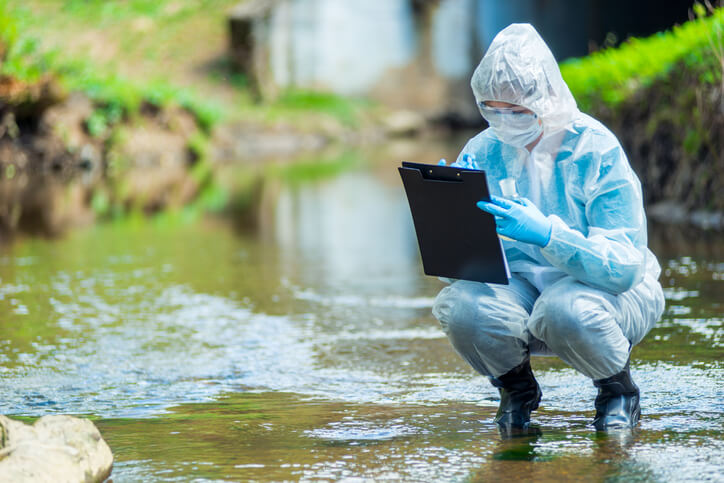Over 80,000 people are diagnosed with non-Hodgkin lymphoma each year, according to the American Cancer Society. While there are several known risk factors, scientific studies have linked many cases to exposure to toxic chemicals.
If you or a loved one has developed non-Hodgkin lymphoma after chronic exposure to hazardous chemicals, Wool Trial Law can help. We have extensive experience litigating toxic substance mass torts and an impressive track record of success, having achieved multi-million dollar settlements and jury verdicts.
When you become our client, we will leverage our skills and resources to identify the responsible party, hold them accountable, and get you meaningful compensation. Contact our office today to get started with an accomplished non-Hodgkin lymphoma mass tort attorney.
Understanding Non-Hodgkin Lymphoma
Non-Hodgkin lymphoma (NHL) is a form of cancer that originates in the lymphatic system, comprised of tissues, vessels, and lymph nodes that circulate throughout the body. NHL occurs when white blood cells produced by the lymphatic system abnormally grow into cancerous tumors. Non-Hodgkin lymphoma can originate anywhere lymph tissue is found, such as:
- Lymph nodes – These are small, bean-shaped glands located throughout the body, including the chest, abdomen, neck, armpit, and pelvis. The lymph nodes contain white blood cells and immune cells that fight infections by attacking germs carried through the lymph fluid. The body has hundreds of lymph nodes connected by the lymphatic vessels.
- Spleen – This internal organ produces immune defense cells and filters waste from the blood.
- Bone marrow – This tissue in the inner bone produces blood cells or platelets.
In addition, NHL can originate in the adenoids, tonsils, and thymus.
Types of Non-Hodgkin Lymphoma
There are various subtypes of NHL depending on the type of white blood cells involved, either B-cell or T-cell lymphoma:
- B-cell lymphoma is the most common type of non-Hodgkin lymphoma, accounting for over 85 percent of all cases. There are several subtypes of B-cell lymphoma.
- T-cell lymphoma is a rare type of NHL, accounting for less than 15 percent of all cases, with many subtypes.
Subtypes of NHL are classified by how fast the cancer cells grow and spread. Slow-growing types of non-Hodgkin lymphoma are known as “indolent lymphomas,” such as follicular lymphoma. Fast-growing and spreading forms of NHL are “aggressive lymphomas,” with diffuse large B-cell lymphoma being the most common.
Risk Factors for NHL
Several known risk factors make certain people more prone to developing non-Hodgkin lymphoma, including:
- Age – Older people are far more likely to develop NHL; however, certain types are actually more common in young people.
- Gender – Men have a slightly higher risk of developing non-Hodgkin lymphoma than women.
- Genetic predisposition – Those with a family history of NHL are at an increased risk of NHL.
Notably, scientific studies have identified a link between NHL and chronic exposure to toxic chemicals such as benzene and certain herbicides (weed killers).
Non-Hodgkin Lymphoma Mass Tort Lawsuits
Non-Hodgkin’s lymphoma has recently become a primary injury claim in noteworthy mass torts and individual lawsuits:
Roundup NHL Lawsuits
Monsanto’s Roundup, once one of the most popular herbicide weed killers on the market, has been linked to non-Hodgkin lymphoma and other cancers. Thousands of product liability lawsuits were filed against Bayer (which acquired Monsanto in 2018) alleging glyphosate, the main ingredient in Roundup, causes NHL. Bayer has already paid billions to settle a large percentage of these lawsuits and recently announced that it intends to replace glyphosate-based consumer products with new formulations beginning in 2023.
Camp Lejeune NHL Lawsuits
From the 1950s to the late 1980s, toxic substances such as perchloroethylene (PCE), trichloroethylene (TCE), and benzene leached into the drinking water at Camp Lejeune Marine Corps Base in North Carolina. Service members, contractors, and military families exposed to the toxins through drinking, cooking, and bathing water developed all types of illnesses and cancers, including non-Hodgkin lymphoma.
The Camp Lejuene Justice Act allows victims to file a civil lawsuit to recover damages for injuries and losses resulting from exposure to contaminated water. Our firm is investigating Camp Lejuene water contamination injury claims and preparing to represent victims in NHL lawsuits that will likely become mass torts, given the number of victims.
Monsanto Quikpro NHL Settlement
Wool Trial Law recently achieved a significant settlement with Bayer in a case involving Monsanto’s Quickpro, a commercial herbicide with a more concentrated glyphosate formula than Roundup. Our client, a professional landscaper, alleged he developed non-Hodgkin lymphoma after using Quickpro on commercial properties throughout the St. Louis area, including Monsanto’s headquarters and that Monsanto knew the product was dangerous but failed to disclose the potential risks to the public.
Contact Wool Trial Law About NHL Lawsuits
If you or a family member has developed non-Hodgkin lymphoma from exposure to toxic chemicals, you need the informed representation we provide. When you meet with us, we will determine whether your claim is valid, take the appropriate legal action, and protect your rights. Trust us to fight for the maximum compensation you deserve, whether through an individual lawsuit or NHL mass tort. Above all, we will stand by every step of the way and work strategically to achieve the best possible outcome.
There are several promising treatments for non-Hodgkin lymphoma and the overall 5-year survival rate is 73 percent, according to the American Society of Clinical Oncology (ASCO). But who will cover your mounting medical expenses, lost wages from not being able to work, pain and suffering, and other losses? The sooner you contact Wool Trial Law, the sooner we can start working on your claim.

